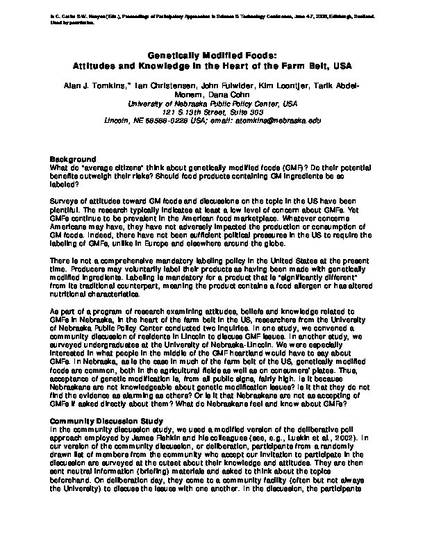
What do “average citizens” think about genetically modified foods (GMF)? Do their potential benefits outweigh their risks? Should food products containing GM ingredients be so labeled?
Surveys of attitudes toward GM foods and discussions on the topic in the US have been plentiful. The research typically indicates at least a low level of concern about GMFs. Yet GMFs continue to be prevalent in the American food marketplace. Whatever concerns Americans may have, they have not adversely impacted the production or consumption of GM foods. Indeed, there have not been sufficient political pressures in the US to require the labeling of GMFs, unlike in Europe and elsewhere around the globe.
There is not a comprehensive mandatory labeling policy in the United States at the present time. Producers may voluntarily label their products as having been made with genetically modified ingredients. Labeling is mandatory for a product that is “significantly different” from its traditional counterpart, meaning the product contains a food allergen or has altered nutritional characteristics.
As part of a program of research examining attitudes, beliefs and knowledge related to GMFs in Nebraska, in the heart of the farm belt in the US, researchers from the University of Nebraska Public Policy Center conducted two inquiries. In one study, we convened a community discussion of residents in Lincoln to discuss GMF issues. In another study, we surveyed undergraduates at the University of Nebraska-Lincoln. We were especially interested in what people in the middle of the GMF heartland would have to say about GMFs. In Nebraska, as is the case in much of the farm belt of the US, genetically modified foods are common, both in the agricultural fields as well as on consumers’ plates. Thus, acceptance of genetic modification is, from all public signs, fairly high. Is it because Nebraskans are not knowledgeable about genetic modification issues? Is it that they do not find the evidence as alarming as others? Or is it that Nebraskans are not as accepting of GMFs if asked directly about them? What do Nebraskans feel and know about GMFs?
Available at: http://works.bepress.com/alan_tomkins/32/

Published by C. Carter & W. Kenyon (Eds.), Proceedings of Participatory Approaches in Science & Technology Conference, June 4-7, 2006, Edinburgh, Scotland